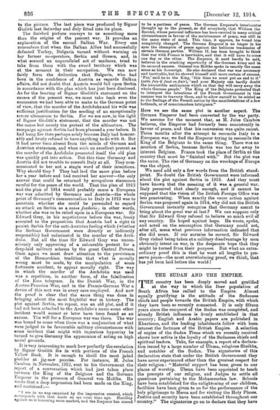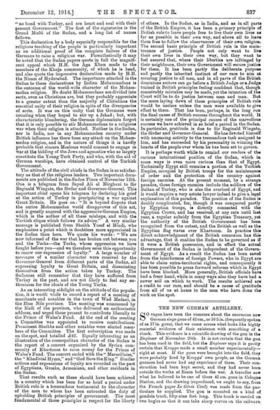THE SUDAN AND THE EMPIRE. T HE country has been deeply
moved and gratified at the way in which the Boer population of South Africa has rallied to the Empire. Almost equally gratifying is the attitude of the Sudanese chiefs and people towards the British Empire, with which they have been so recently connected. It is only fifteen years since the conquest of the Sudan was completed, and already British influence is firmly established in that country ; English and Arabic papers are published in Khartoum, and the leading inhabitants follow with keen interest the fortunes of the British Empire. A selection of copies of the Sudan Times which we recently received shows how active is the loyalty of the Sudanese chiefs and spiritual leaders. Take, for example, a report of a declara- tion issued by a large number of Ulema, religious Sheikhs, and notables of the Sudan. The signatories of this declaration state that under the British Government they have never experienced other than the greatest respect for their religion : "Material support has been given to our places of worship. Ulema have been appointed to teach the precepts of our religion, and Judges to settle all questions pertaining to the Mohammedan law. Schools have been established for the enlightening of our children, facilities have been given to us for the performance of the holy pilgrimage to Mecca and for visiting the Holy Places. Justice and security have been established throughout our country." The signatories go on to declare that they have " no bond with Turkey, and are heart and soul with their present Government." The first of the signatories is the Grand Mufti of the Sudan, and a long list of names follows.
This declaration by a body especially responsible for the religious teaching of the people is particularly important as an additional proof of the complete failure of the Germans to raise a religicus war. Parenthetically it may be noted that the Sudan papers quote in full the magnifi- cent appeal which H.H. the Aga Khan made to the members of the Khoja community, of which he is head, and also quote the impressive declaration made by H.H. the Nizam of Hyderabad. The importance attached in the Sudan to these declarations by Indian Mohammedans is the outcome of the world-wide character of the Moham- medan religion. No doubt Mohammedans are divided into sects, even as Christians are, but they probably appreciate to a greater extent than the majority of Christians the essential unity of their religion in spite of the divergencies of sects. It was on this unity that the Germans were counting when they hoped to stir up a Jehad ; but, with characteristic blundering, the German diplomatists forgot that it is only possible to stir Mohammedans to a religious war when their religion is attacked. Neither in the Sudan, nor in India, nor in any Mohammedan country under British influence has there been any attack on the Moham- medan religion, and in the nature of things it is hardly probable that sincere Moslems would consent to engage in war at the bidding of the Jews and agnostics who so largely constitute the Young Turk Party, and who, with the aid of German warships, have obtained control of the Turkish Government.
The attitude of the civil chiefs in the Sudan is as satisfac- tory as that of the religious leaders. Two important docu- ments are published in the Sudan Times of November 12th.
One is a telegram from Sayed Ali el Mirghani to Sir Reginald Wingate, the Sirdar and Governor-General. This important chief opens his telegram by declaring his grief at the action of Turkey in precipitating a war against Great Britain. He goes on : " It is beyond dispute that the entire Mohammedan world disapproves of this act, and is greatly angered with the aggressive German Empire, which is the author of all these mishaps, and with the Turkish clique which follows its advice." A very similar message is published from Sheikh Yusef el Hindi, who emphasizes a point which is doubtless more appreciated in the Sudan than here. We quote his words : " We are now informed of the war that has broken out between you and the Turks—the Turks, whose oppression we have fought before you—and we therefore seize this opportunity to renew our expression of loyalty." A large number of messages of a similar character were received by the Governor-General from different parts of the Sudan, all expressing loyalty to Great Britain, and dissociating themselves from the action taken by Turkey. The Sudanese still remember that they have suffered from Turkey in the past, and are not likely to feel any en- thusiasm for the ideals of the Young Turks.
As an interesting sidelight on the attitude of the popula- tion, it is worth while to record a report of a meeting of merchants and notables in the town of Wad Medani, in the Blue Nile province. The meeting was summoned by the Kadi of the province, who delivered an enthusiastic address, and urged those present to contribute liberally to the Prince of Wales's Fund. At the end of the meeting a Committee was appointed to receive contributions. Prominent Sheikhs and other notables were elected mem- bers of the Committee. The first subscription was made on the spot, and totalled £42. Equally interesting as an illustration of the cosmopolitan character of the Sudan is the report of a concert organized by the Syrian com- munity of Khartoum to raise money for the Prince of Wales's Fund. The concert ended with the " Marseillaise," the " Khedivial Hymn," and "God Save the King." Similar actions and expressions of loyalty are recorded on the part of Egyptians, Greeks, Armenians, and other residents in the Sudan.
That results such as these should have been achieved in a country which has been for so brief a period under British rule is a tremendous testimonial to the character of the men to whom has been entrusted the duty of upholding British principles of government. The most fundamental of those principles is respect for the liberty of others. In the Sudan, as in India, and as in all parts of the British Empire, it has been a primary principle of British rule to leave people free to live their own lives as far as possible in their own way, and above all to leave them free to follow the observances of their own religion. The second basic principle of British rule is the main- tenance of justice. People not only want to live their own lives in their own way, but they want to feel assured that, where their liberties are infringed by their neighbours, their own Government will secure justice for them. It has been partly the deliberate purpose and partly the inherited instinct of our race to aim at securing justice to all men, and in all parts of the British dominions suitors can go before a British Judge or a Judge trained in British principles feeling confident that, though conceivably mistakes may be made, yet the intention of the Court will be to do justice between man and man. But the mere laying down of these principles of British rule would be useless unless the men were available to give effect to them. That has been, perhaps, in the long run the final cause of British success throughout the world. It is certainly one of the principal causes of the marvellous success we have achieved in so brief a period in the Sudan. In particular, gratitude is due to Sir Reginald Wingate, the Sirdar and Governor-General. He has devoted himself with unceasing activity to the tremendous task assigned to him, and has succeeded by his personality in winning the hearts of the people over whom he has been set to govern.
It is perhaps worth while to remind our readers of the curious international position of the Sudan, which in some ways is even more curious than that of Egypt. Technically Egypt still remains a portion of the Turkish Empire, occupied by British troops for the maintenance of order and the protection of the country against foreign enemies. At the present moment, by a strange paradox, those foreign enemies include the soldiers of the Sultan of Turkey, who is also the overlord of Egypt, and it would require a very astute lawyer indeed to give a legal explanation of this paradox. The position of the Sudan is doubly complicated, for, though it was conquered partly by Egyptian troops, is directly connected with the Egyptian Crown, and has received, at any rate until last year, a regular subsidy from the Egyptian Treasury, yet the authority of the British Government has been recognized from the outset, and the British as well as the Egyptian flag waves over Khartoum. In practice this direct acknowledgment of the British connexion has this advantage, that it enables the Sudan to be governed as if it were a British possession, and in effect the actual Government of the Sudan is independent of the Govern- ment of Egypt. As a result the Sudan has been saved from the interference of foreign Powers, who in Egypt are able to claim extra-territorial rights, and consequently it has been possible to press forward reforms which in Egypt have been blocked. More generally, British officials have had a freer hand, while in many ways also they have had a newer soil on which to work. The results achieved are a credit to our race, and should be a cause of gratitude from all of us at home to the men who have done the work on the spot.















































 Previous page
Previous page